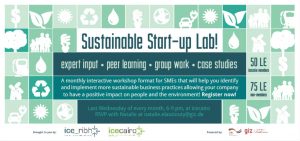Partnering with Social Enterprises for sustainable and inclusive business models
On behalf of the German Federal Ministry for Economic Cooperation and Development (BMZ), GIZ has established a global network of Responsible and Inclusive Business Hubs (RIBHs) in Cairo, Jakarta and Pretoria. The RIBHs are supporting businesses, social enterprises and start-ups in designing and implementing their business activities in a sustainable an d inclusive way.
How to meet the needs of Egyptian women and their families in rural communities concerning nutrition, food safety and health? How to address the socio-economic challenges faced by rural communities in South Africa living on less than 1USD a day? Or how can start-ups and entrepreneurs in the renewable energy sector in the MENA region become more sustainable and inclusive? These and similar questions and challenges are being addressed by the Responsible and Inclusive Business Hubs (RIBHs) through implementing projects in cooperation with social enterprises.
The Baladini „kitchen Incubator“ – a shared kitchen for healthy and sustainable food

The Baladini Kitchen Incubator is a project founded by the Nawaya social enterprise. The organization is building a shared equipped kitchen space in a rural area of Egypt to educate and empower local women on how to cook artisanal, sustainable and healthy food, which they can sell to the public afterwards. However, the concept does not only offer a central space for the production of food, in a second step it also supports women in learning how to run their own restaurant or catering business with the goal of improving life quality of the local community. The RIBH MENA supported Baladini with access to a range of experts and knowledge in order to implement a series of initial trainings and helped the project jump from a basic level to a competitive position in the market.
Please find out more.
The Sustainable Start-Up Lab – supporting sustainable and social entrepreneurs
The Sustainable Start-Up Lab targets start-ups and entrepreneurs who wish to become more sustainable and inclusive. The training, which takes place over several days, aims to enhance understanding of sustainable and inclusive business issues, communicate concepts and develop specific project approaches. A manual has been compiled in English, French and Arabic to facilitate training. Since the first workshop in Egypt in 2014, more than 100 companies and start-ups have taken part in the lab and have implemented activities and realized new business models based on the solutions developed there.


A sector-specific format for renewable energy was introduced in 2015. In early 2016 it was integrated into the start-up programme of the consulting firm PricewaterhouseCoopers (PwC) in the area of renewable energies in conjunction with the Cleantech Arabia energy network, and is to be replicated in other countries in the future. In mid-August the second Sustainable Start-Up workshop in 2016 was held with 23 start-ups.
Please find out more on fb
Creating inclusive and social business opportunities in rural areas in South Africa

The family-run business and social enterprise Botanica Natural Products (Pty) Ltd. produces organic cosmetic and nutraceutical raw materials from indigenous plants in rural Limpopo, South Africa. They created employment opportunities for locals of a neighboring tribal village and began sourcing indigenous plants that could adapt to the specific climate. 15 full-time employees are currently producing an organically certified extract from the Bulbine Frutescens plant, which is a traditional medicinal plant. Furthermore, Botanica has developed a method of extracting substances of the plant that can be used in the cosmetic industry for skin and hair care products. Together with the RIBH SADC they are now working on business development that will bring even greater benefits to the community: a network of out-growers from the near-by local community that could supply plant material to Botanica on a contract basis.
To find out more: Botanica was a winner of the SEED Award.
The RIBHs advise established companies, social enterprises and start-ups on how to design and implement their business models in a sustainable and inclusive manner. With their regional presence, expertise, and established networks and partner structures, they not only advise and develop contacts between local and international businesses, but also serve as a point of contact for intermediaries and regional actors.
More information on www.giz.de/business-hubs
This blog is part of the October 2016 series on Exploring the social enterprise landscape, in partnership with the World Bank Group and endeva. Read the whole series for insight and opinion on policy, business models and definitions from social entrepreneurs, policy makers and facilitators around the world.